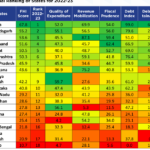India’s Budget Session : Understanding Its Constitutional Framework

Budget Session of the Parliament will begin on 31st January and conclude on 13th February.
LEARNING FROM HOME/WITHOUT CLASSES/BASICS
The financial year in India commences from 1st April every Year. Before the start of each financial year, the government of India seeks the permission/approval of the Parliament to raise income and to make expenditures in the coming financial year.
BUDGET
Article 112 of the constitution of India states detailed financial procedure
The budget, introduced by the Finance Minister, shows the estimated receipts and expenditure for the coming financial year.
Article 112 of the constitution of India provides that at the beginning of the every financial year, the President shall, in respect of the financial year, cause to be laid before both the houses of Parliament a statement of the estimated receipts and expenditure of the government of India for that year.
The Budget statement shows the receipts and payments of the government of India(GOI) under three heads, namely, (i) Consolidated Fund; (ii) Contingency Fund, and (iii) Public Account.
Consolidated Fund of India
All revenues received by the government of India except certain taxes transferred to states.
The government raises all loans and credits all money received in repayment of loans to the Consolidated Fund of India.
Under Article 112 (3), the salary and allowances of the President of India, the presiding officers of both Houses of the Parliament, the Judges of the Supreme Court and the High Courts of India, the Comptroller and Auditor General of India, and certain other expenditures are charged upon the Consolidated Fund of India. These items, though placed before the Parliament, are not votable.
Other items of expenditure, votable, presented to the Lok Sabha in the form of demands for grants. The House has the power to either grant or reduce or reject these demands, but it cannot increase the demands.
The Contingency Fund of India
It is an impress placed at the disposal of the President of India to meet urgent unforeseen expenditure. The Parliament must authorize this expenditure
Public Account of India
Besides the normal receipts and expenditure of the government of which pertain to the CFI certain other transactions enter the government account. In respect of these transactions the government acts as a banker.
These transactions relates to Provident Funds, Small Savings, Collections, other deposits etc. The Public Account of India collects such money.
This covers the money received by an officer or court in connection with affairs of the union.
- A money bill or finance bill dealing with taxation cannot introduced in the Rajya Sabha. It must introduced only in the Lok Sabha. (Art 109)
- The Rajya Sabha has no power to vote on the demand for grants. It is the exclusive privilege of the Lok Sabha.
- The Rajya Sabha should return the Money bill (or Finance bill) to the Lok Sabha within fourteen days.
- The Lok Sabha can either accept or reject the recommendations made by Rajya Sabha in this regard.






0 Comments